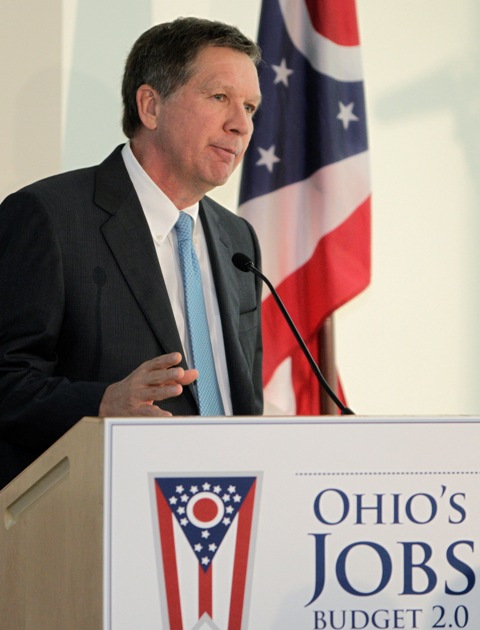
BACKS MEDICAID EXPANSION–Ohio Gov. John Kasich presents the fiscal year 2014-15 executive budget proposal during a news conference Monday, Feb. 4, in Columbus, Ohio. (AP Photo/Jay LaPrete)
Ohio GOP governor backs federal Medicaid expansion
by Ann Sanner
Associated Press Writer
COLUMBUS, Ohio (AP) — Ohio’s Republican governor announced Monday he will push for expanding Medicaid under the federal health care law, a move that would give many more poor people access to government care.
It also sets up a potential fight among the governor and Republicans who control the state Legislature and are strongly against President Barack Obama’s health care law.
The state anticipates more than 365,000 Ohioans will be eligible for coverage beginning in 2014 by expanding Medicaid, the health program for the poor that already provides care for one of every five residents in the state.
A broad group of Ohio’s doctors, hospitals and health providers back the idea, as does the Ohio AARP.
Gov. John Kasich, who last summer called the federal health overhaul a “massive new tax on the middle class,” proposed the Medicaid expansion in his two-year budget plan released Monday. He now must persuade Republican state lawmakers to back the plan despite the fact that many dislike the law’s mandated coverage and campaigned against it just a few months ago.
Kasich reiterated his opposition to what he called “Obamacare,” saying “I don’t believe in the individual mandate.”
“But I think that this makes great sense for the state of Ohio,” he added.
If Ohio doesn’t extend Medicaid, his administration said, federal tax dollars will be used to expand health coverage in other states and give businesses elsewhere a competitive advantage by creating a healthier workforce.
The leader of the Ohio House has said his fellow Republicans have concerns about the expense of expanding Medicaid. House Speaker William Batchelder told reporters the idea also poses philosophical questions for lawmakers who oppose the law’s mandate that almost everyone obtain health insurance.
Kasich said he views the Medicaid expansion decision separately from the law’s mandate, and he was hopeful that lawmakers would set their ideology aside.
“This is not an endorsement of Obamacare,” he said.
Still, he acknowledged that debate on extending Medicaid coverage wouldn’t be without its legislative fireworks.
“You’re going to have a lot of fun stories to write over the course of the next several months,” Kasich told reporters at his budget briefing.
The federal government will pay the entire cost of the Medicaid expansion for the first three years, gradually phasing down to 90 percent — still well above the current level of 64 percent. Even at those generous rates, however, some GOP governors and state legislatures say they fear being stuck with long-term costs.
Ohio will see an influx of $2.4 billion in federal funds over the next two years beginning in July to cover those who are newly eligible, the administration said.
Separate changes to eligibility for Medicaid will mean that almost 91,000 who are covered by Medicaid will be dropped from the program.
The state also expects to net $235 million because of a boost in tax revenue, plus additional savings from proposed Medicaid eligibility changes and savings on medical care for prisoners.
Kasich proposal also calls for an automatic “opt-out” trigger. Under his plan, if the federal government doesn’t pick up its share of expanded coverage, the program for newly eligible Ohioans would shut down and state taxpayers wouldn’t be stuck with the bill.
Kasich’s decision is significant not only because Ohio is a political bellwether, but also because of his previous service is Congress, where as chairman of the House Budget Committee in the late 1990s he helped pass major legislation to reduce federal debt.
That gives his decision Monday added weight, and could undercut arguments from some conservatives that Washington cannot be trusted to honor its financial commitments for the latest Medicaid expansion.
Ohio was among 26 states that sued to overturn the federal law. The U.S. Supreme Court upheld the heart of the overhaul last year but allowed states to decide whether to expand Medicaid.
Washington, D.C., and 17 states have opted to expand their Medicaid rolls.
Kasich joined Arizona Republican Gov. Jan Brewer in calling for expansion. Several other GOP governors have said they will not go forward, including Rick Perry in Texas, Bobby Jindal in Louisiana and Nikki Haley in South Carolina.
Kasich said he will continue to press federal officials for flexibility on the expansion, perhaps allowing some lower-income Ohioans to get private coverage subsidized by Washington. It’s unclear how far he will get. The governor said talks with the Obama administration were in the early stages.
The Medicaid expansion is intended to cover about half of the 30 million uninsured people expected to eventually gain coverage under the health care overhaul. The law expanded Medicaid to cover low-income people making up to 138 percent of the federal poverty level, or about $15,400 a year for an individual. That provision will mainly benefit low-
income adults who do not have children and currently can’t get Medicaid in most states. Separately, the overhaul provides subsidized private insurance for middle-class households.
Associated Press writers John Seewer in Toledo and Ricardo Alonso-Zaldivar in Washington contributed to this report.